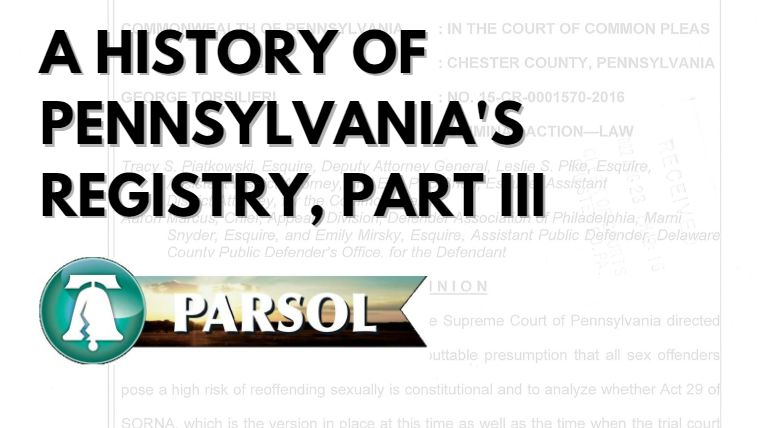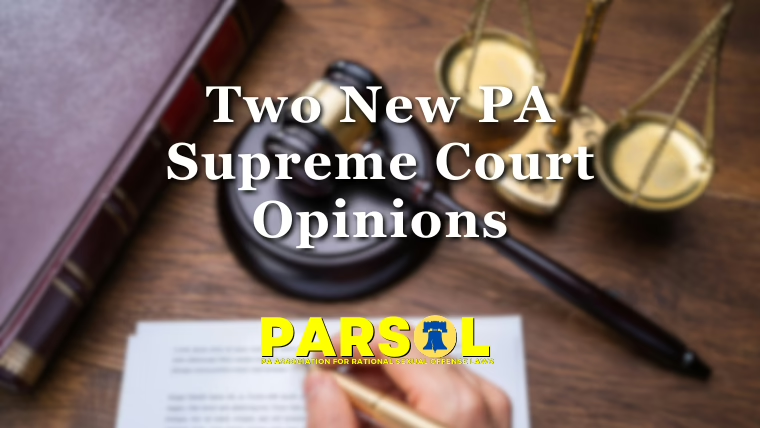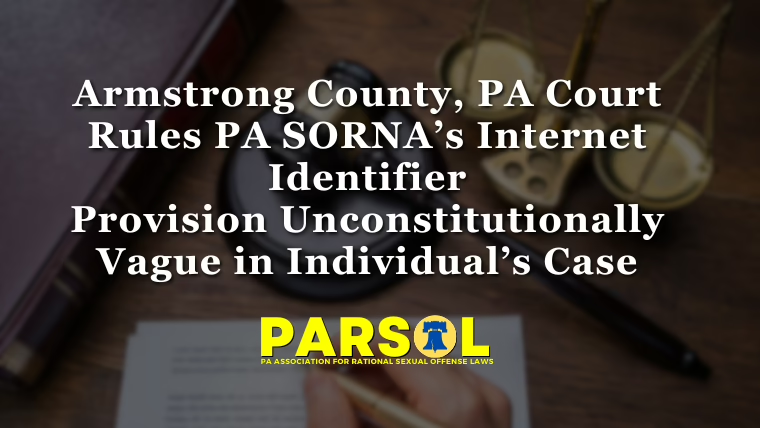Those who wish to understand how Pennsylvania’s Sex Offender Registration and Notification Act (SORNA, Or Megan’s Law) operates today may be dismayed to learn that there are two sets of laws dictating the “who, what, when, where, and hows” of the registry.
Misinformation from law enforcement around this confusing scheme is common. Because persons forced to register (PFRs) can be charged with a felony and sent to prison if they do not register exactly correctly, over-reporting is also common. This results in more work for State Troopers and probation officers who have to input this information, and it also results in a loss of liberty and privacy for PFRs who understandably take a “better safe than sorry” stance towards registration.
As we learned in A History of PA’s Registry, Part II PA enacted SORNA in 2012 to comply with federal guidelines designed to make all states’ registries more uniform. The judicial and legislative acts that brought about the cumbersome and confusing laws that we have today, however, have their roots in the case of Commonwealth v. Muniz from 2007.
Mr. Muniz was convicted of indecent assault in 2007 and was scheduled to be sentenced later that year. Muniz would have been subject to a ten-year reporting and registration requirement under Megan’s Law III, which had been in law since 2004. However, because Muniz left the state and did not report for sentencing, he was not brought before the court again until his apprehension in 2014.
As the PA General Assembly (House and Senate) had replaced Megan’s Law III with SORNA in 2012, Muniz now found himself subject to new registration requirements. He was sentenced to a term of imprisonment and told that he would have to register as “a sex offender” for the rest of his life.
Muniz filed a post-sentence appeal with the Court, claiming that the period of registration should only be ten years, as was law in 2007 when he committed his crime. The trial court denied his claim, and after appealing to the Superior Court, Muniz was also denied. The Supreme Court of PA (SCOPA) granted a review of his claims in 2016.
Muniz and his lawyers asked two questions: Did the application of the new registry requirements under SORNA at the time of his sentencing violate the ex post facto clauses of 1) the US Constitution and 2) the PA Constitution? (Muniz also invoked the idea of registration being an infringement on his Right to Reputation, but this claim was not made correctly in his initial appeal and was therefore not examined by SCOPA.)
There are guarantees against ex post facto (after the fact) laws in the US and PA Constitutions. That is, the government cannot pass a law that makes past behavior subject to punishments today. The aim of these protections is to ensure that all residents may be given “fair warning” as to what is considered a crime and what the consequences or punishments would be if one decides to commit that crime. If ex post facto laws were permitted, vindictive or arbitrary statutes could be passed to find people who were engaged in previously lawful behavior suddenly arrested. Also, those already serving a sentence could find themselves charged and imprisoned for an even longer time.
While this scenario seems to clearly apply to the circumstances of Muniz’s sentence, the lower courts denied his claim because the Commonwealth argued that SORNA is a civil regulatory law meant to inform and protect the public rather than punish a crime committed. Because there are no consequences to registration, the lower courts reasoned, the ex post facto punishment claims did not apply here.
As Muniz and his attorneys asserted that the text of the law and the serious penalties for not obeying the law made it clear that the aim was to punish, SCOPA decided to more closely analyze the idea of the registry being punishment. First, they concluded that the intent of the PA General Assembly was non-punitive: SORNA was passed in order to comply with the federal SORNA standards and to “promote public safety through a civil, regulatory scheme.” (More on SORNA can be found in A History of PA’s Registry, Part II and Part I.)
SCOPA then considered 7 elements that help define whether a law can be considered punishment. The Mendoza-Martinez factors (so named after a 1963 Supreme Court of the United States case involving draft-dodging), that were analyzed are as follows:
- whether the statute imposes an affirmative disability or restraint;
- whether the resulting sanction or burden has historically been regarded as punishment;
- whether the statute comes into play only on a finding of a scienter;
- whether the statute promotes retribution and deterrence, traditional aims of punishment;
- whether the behavior to which it applies is already a crime;
- whether the statute is rationally connected to an alternative purpose other than punishment; and
- whether the statutory sanction or burden appears excessive in relation to the alternative purpose
SCOPA examined each factor in its decision and in July 2017 concluded that the requirements of PA’s SORNA did meet the threshold to be considered punishment. Despite the Commonwealth’s claim that it was not punitive, the state’s highest court found that SORNA violated the US Constitution’s prohibition against ex post facto laws. The Court then declared that because PA’s Constitution provides even more protection for citizens than the US Constitution, SORNA also violated the state constitution’s protections.
Because both the state and the offender have an interest in “the finality of sentencing” and because SORNA imposes requirements that are so burdensome as to become punitive, SCOPA declared that Muniz did not have to comply with the part of his sentence that involved SORNA.
The General Assembly now had a real problem on its hands: thousands of people who were subject to registration for crimes committed before Dec. 20, 2012 were in the same scenario as Muniz. As SCOPA rulings apply to the entire state, the State Police would now have to remove all of these people from the registry. This would cause Pennsylvania to become non-compliant with federal SORNA.
The state Legislature’s solution was to create parallel registry schemes that would run concurrently and all feed into one database. One set of standards, referred to as Subchapter H, would maintain the requirements of federal SORNA but would only apply to people who committed a registerable offense on or after 12/20/2012. (Although SCOPA found these requirements to be punitive in nature, they could still be applied to people who [in theory] were aware of the law and consequences of their crimes at the time they committed them.)
Another set of standards, known as Subchapter I, would impose the requirements of the PA Registry that was in place before SORNA was enacted on 12/20/2012 and would only apply to people whose crimes were committed before that date. The General Assembly rationalized that these less-burdensome requirements would not constitute punishment and therefore respect SCOPA’s decision in Muniz.
In 2018, Governor Wolf signed Acts 10 and 29 into law, amending the statute that set forth penalties for failure to comply with the SORNA Laws in PA. They clearly defined who must register and how to set forth penalties for failure to comply. They also created a process for a PFR to petition to be removed from the registry after a period of 25 years.
This is the current state of affairs in Pennsylvania. We have a lengthy, confusing set of laws that are labeled as a harmless civil regulatory scheme comparable to a driver’s license but which carry with them felony charges and long prison sentences if they are not followed precisely.
We make available the intimate details of people’s lives on a public website where anyone in the world can casually browse for any reason or no reason. This worldwide access to personal information about PA residents is a far cry from what most people think about when they think of the goal of the sex offense registry: to keep neighbors safe from a sexual predator on their block.
We reinforce the false idea that the public sex offense registry is, as the PA Attorney General wrote in 2019, “essential to the public protection of Pennsylvanians”. In reality, decades of peer-reviewed research inform us that rates of sexual crimes before and after the imposition of public sex offense registries have not changed and that the rate of recidivism for people on PA’s registry is among the lowest of any class of former offender.
We bend over backward to salvage this draconian and dated strategy by enacting more and more legislative fixes that continue to be ruled infirm in our state’s courts. Our registry laws are a condemned structure that needs to be demolished, not repaired.
If you’ve been following PARSOL or the sex offense law reform movement, you know that this is not where the story ends. In August 2022, the Chester County Court of Common Pleas declared that SORNA in its current form violates the PA Constitution in more than one dimension. SCOPA has taken on the appeal for Commonwealth v Torsilieri and is expected to make a ruling sometime in 2023.
There are no winners when it comes to sexual crimes. Our minds are perhaps the most vulnerable part of ourselves, and the trauma that can come from having another person take advantage of us can be devastating. Let us look towards those professionals who have dedicated their lives to developing effective methods of prevention so that we can truly say that we, as a society, are doing our best to stop further harm. The public sex offense registry has proven to be a failed experiment, and it is time to move on.




